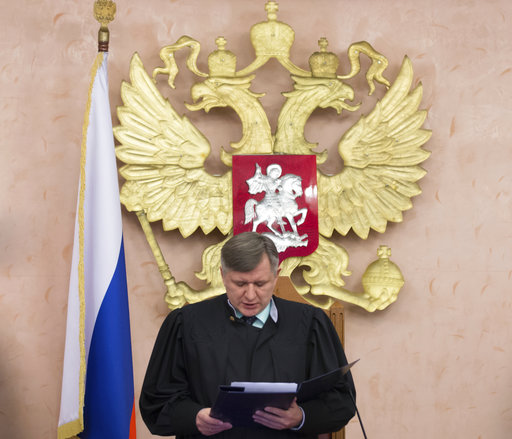
Russia’s Supreme Court judge Yuri Ivanenko reads the decision in a court room in Moscow, Russia, on Thursday, April 20, 2017. Russia’s Supreme Court has banned the Jehovah’s Witnesses from operating in the country, accepting a request from the justice ministry that the religious organisation be considered an extremist group, ordering closure of the group’s Russia headquarters and its 395 local chapters, as well as the seizure of its property. AP
MOSCOW — Russia’s Supreme Court issued a ruling Thursday banning Jehovah’s Witnesses and seizing their property after the justice ministry called on it to dissolve the Christian group as an “extremist organization.”
READ: Pinoy Jehovah’s Witnesses in Russia face deportation
Supreme Court judge Yury Ivanenko said Russia had decided to close down “the administrative center of Jehovah’s Witnesses and the local organizations in its fold and turn their property over to Russia.”
The decision comes after the ministry said it had found signs of “extremist activity” within the religious movement and requested that it be banned.
“They represent a threat to the rights of the people, to public order and public safety,” Russian news agencies quoted justice ministry representative Svetlana Borisova as saying.
The religious movement, which has 395 centers across Russia, has vowed to appeal the decision.
“I’m shocked,” Yaroslav Sivulsky, who represents the group’s administrative center, told reporters.
“I didn’t expect that this could be possible in modern Russia, where the constitution guarantees freedom of religious practice.”
Sivulsky added that the group would take its case to the European Court of Human Rights if its appeal was rejected.
He said he feared that members of the group could face prosecution if they continued to gather and study the Bible.
“We fear that people will end up in jail,” he said.
‘Destructive sect’
There are some 175,000 Jehovah’s Witnesses in Russia, according to the group.
The powerful Russian Orthodox Church has spoken out against the group, with one church official branding it a “destructive sect” last month.
Members of the Jehovah’s Witnesses — a Christian evangelical movement that was born in the United States in the 19th century — consider modern churches to have deviated from the Bible’s true teachings. They reject modern evolutionary theory and refuse blood transfusions.
There are more than eight million Jehovah’s Witnesses worldwide, with some countries classifying the group as a sect.
Its members are known for preaching on doorsteps, where they offer religious literature and attempt to convert people.
Russia’s Jehovah’s Witnesses have had several run-ins with law enforcement in recent years.
In January, the leader of a congregation in the town of Dzerzhinsk in the central Nizhny Novgorod region was fined for distributing materials that authorities deemed extremist, local media reported.
In 2004 Russia dissolved the Moscow branch of the Jehovah’s Witnesses. The European Court of Human Rights ruled in 2010 that the move had violated the right to freedom of religion and association.
The Moscow branch at the time had been accused of breaking up families, inciting its members to suicide and endangering their lives and health by not allowing its members to have blood transfusions./rga